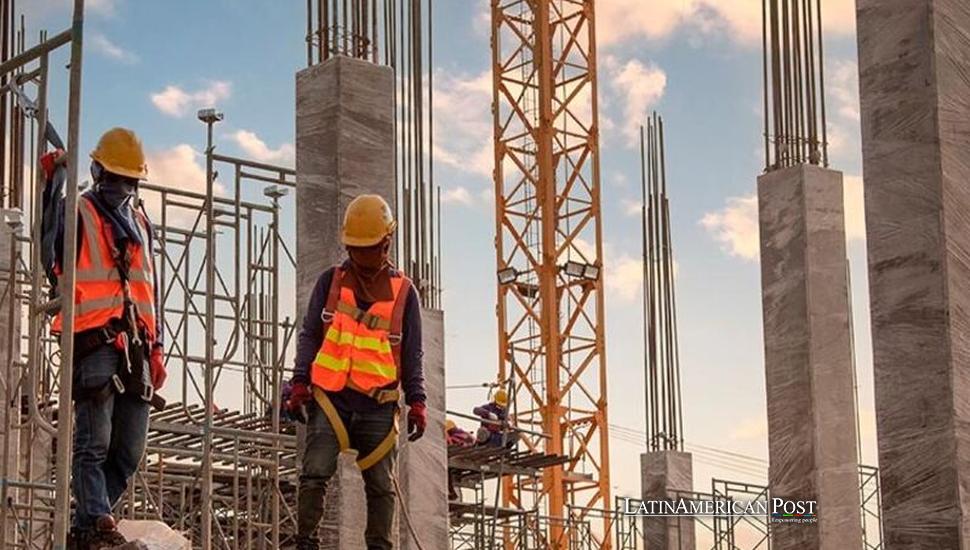How Construex is Transforming Latin America’s Construction Industry

With Construex, Latin America’s largest digital platform for construction, Avalos is driving change in the industry, making it more transparent, efficient, and, ultimately, more sustainable. Avalos and his team level the playing field daily by linking underbuying contractors with small and medium-sized businesses and suppliers—SMEs.
A Game-Changer for Latin America’s Construction Sector
Infrastructure investment is critical for the development of Latin America, where an estimated $2.2 trillion will be needed by 2030 to meet the United Nation’s Sustainable Development Goals. The region’s construction sector, which comprises 4 percent of Latin America’s GDP, is also a significant employer (30 million of the 70 million strong labor force), so making it more efficient can significantly affect the region’s economy. The problem is that building useful things is difficult due to the heightened complexity of the supply chains and the considerable price fluctuation across the sectors involved. With the skyrocketing prices, uncertainty of payments, and delays in the delivery of orders, getting things done within the construction sector can be frustrating. Forbes explains it was ‘notoriously inefficient.’
The Coventor platform, launched in 2019 by the Brazilian entrepreneur Roberto Arroyo, tackles these problems by digitizing and streamlining the construction supply chain. Construex was initially born of Arroyo’s frustration with what he describes as ‘excessive inefficiencies’ he had encountered while working for his family’s construction business. Today, it is the largest construction marketplace in Latin America, with one million sellers across Mexico, Guatemala, Chile, Argentina, and Ecuador, aggregating data on pricing, availability, and supplier information to provide offer tools that help companies make faster and more cost-effective purchasing decisions, according to Forbes.
That has made Construex an avenue for SMEs to compete with their bigger rivals. Thanks to its data-driven insights and digital supply chain management tools, Construex helps reduce up to 15 percent of costs and shorten project timelines by as much as 30 percent, according to Forbes, which touts the platform as a ‘game changer for small builders looking to edge out the biggest names in the field.’
Empowering Family-Owned SMEs and Promoting Sustainability
Latin America’s construction business is a maze of small- and medium-sized enterprises (SMEs), many of which are family-owned. Arroyo worked in the construction industry as a boy, right next to laborers, and understood their challenges well. ‘For all the little businesses out there that want to capture the growth opportunity, they really need some help with supply chain inefficiencies, managing price fluctuations, and surety of supply,’ he told Forbes. Construex’s platform helps to provide all that. It offers SMEs access to a vast network of suppliers.
One of the thousands of businesses impacted is Puruhá, a 30-year-old builder’s merchant in Ecuador, who Construex’s General Manager Michelle del Pozo says ‘helped us to position the brand and reach organizations and people who are high-quality leads and truly interested in our products, allowing us to open new businesses and increase sales,’ as she told Forbes. Beyond increasing sales for its businesses, Construex is also making renewable energy solutions more readily accessible across its network. With Latin America experiencing many climate-related crises, including drought and wildfires, the appetite for clean energy alternatives proliferates.
He believes Construex could be part of the solution. ‘Our responsibility is big because of the next generations,’ Arroyo shared with Forbes in 2019 as part of a company profile. Many micro and small entrepreneurs want to install gas generators, but we are helping them think about renewable energy solutions, such as solar systems.’ By making solar options available in the construction marketplace, Construex helps guide Latin America’s SMEs toward low-carbon practices for a more resilient future.
Transparency and Efficiency Through Digitization
Forbes reported that another big win for Construex is transparency. Construction supply chains, like many industries, have historically lacked transparency. This was because construction companies had to manually contact many different suppliers to buy materials, a time-consuming yet crucial process that added significant carbon emissions to the atmosphere through inefficient travel. Construex’s online platform has made these interactions entirely digital, from finding a supplier to checking prices to placing an order. This has been highly valuable in Latin America, where information is often complex.
The data analytical prowess exhibited by the platform allows construction companies to make smarter decisions, thereby reducing costs and improving timelines – the latter, Construex estimates, by up to 30 percent through scheduled optimization and demand forecasting. ‘The stability of supply and the timeline of a project can be affected by peaks and troughs in market volatility. This [phenomenon] is exacerbated by the pandemic, which had an uncertain global impact on cashflows,’ Kevin Barker, the director of Construex, told Forbes magazine. ‘[Construex’s] scale allows buyers and sellers to anticipate these fluctuations and make more sustainable procurement decisions.’ By providing SaaS for free for buyers and sellers, the network effect is also driven by rapidly increasing adoption across the ecosystem.
For most SMEs that don’t have the resources to implement their own digital solutions, Construex’s platform is a game-changer. According to Forbes, ‘[B]y digitizing the construction industry and leveling the playing field by providing free access to information to the smallest businesses, Construex is transforming the way Latin America’s construction sector functions and its growth prospects.’ The network effect has been the catalyst that drove Construex’s speed to scale and maturity.
Building a Bridge to Sustainable Development and Economic Growth
Construex can help a developing area grow in more ways than just construction – by promoting efficiency, supporting sustainability, and opening the smaller markets of Latin America to North American commerce. ‘It’s become an excellent resource for US-based contractors and companies looking at Latin America increasingly through nearshoring,’ Knupp told Forbes. ‘[Construex is] providing visibility through the supply chain we didn’t have before. What Construex is aggregating is critical for the future of doing business efficiently in Latin America.
With expansion into Brazil on the horizon, aided by new partnerships and venture capital investment, Construex is poised to make further inroads into the region’s construction sector. But Arroyo’s commitment to a sustainable and transparent future for Construex extends beyond financial growth and into the platform’s larger vision. By encouraging SMEs to embrace renewable energy practices, Construex is working to tackle some of the region’s pressing environmental issues, including deforestation and climate change in Brazil.
Construex’s trajectory also shows the importance of Latin America in the construction industry, a sector ripe for global innovation, and the potential impact of technology on the industry and the region. As Forbes described, ‘its goal of promoting SME participation, improving transparency and sustainability … helps position the company as the cornerstone in the region’s ongoing drive for sustainable development’. Arroyo summed it up for Forbes: The construction industry is one of the most significant contributors to the region’s economic activity. If we can help make this sector more efficient, we can contribute to improving the living conditions of millions of people.
Also read: Can U.K. Music Stay Ahead as Latin America Rises?
Construex’s capitalist-driven ambitious plan proposes a green future for the construction industry in Latin America. Their efforts to create a network of transparency helping to reduce costs and emissions and their renewable energy grid show how technology can make a brighter future and a cleaner world. Those above and ambitious expansion plans for Construex, as well as their activism towards small- to medium-sized companies, signal that their business project is set to stay in Latin America for many years to come, demonstrating why they can be not only the construction protagonists of a green future for the region but also guiding a path for other countries around the world.





